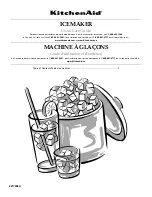
FR
EN
SK
HU
RO
BG
SL
BIH
SR
HR
ET
LT
LV
22
A beep is emitted.
is displayed and the 2 dots on the timer blink. The countdown begins. The
ON light switches on. No beep will go off during the course of a programme which has been deferred.
If you make a mistake or want to change the time setting, hold down the
button until it makes a
beep. The default time is displayed. Start the operation again.
With the delayed start programme do not use recipes which contain fresh milk, eggs, soured
cream, yoghurt, cheese or fresh fruit as they could spoil or stale overnight.
10. STOPPING A PROGRAMME
• At the end of the cycle, the programme stops automatically.
• To stop the programme underway or cancel the delayed start, press and hold the button
5 sec.
11. TAKING YOUR BREAD OUT OF THE PAN
• This stage is not applicable to the baguette cycle.
• Unplug the breadmaker at the end of the cooking or warming cycle
- FIG.12
.
• Tilt the bread tank slightly to the side then unclip to remove it. Always use oven gloves as the pan
handle is hot, as is the inside of the lid
- FIG.13
.
• Turn out the hot bread and place it on a rack for at least 1 hour to cool
- FIG.14
.
• It may happen that the kneading paddles remain stuck in the loaf when it is turned out.
In this case, use the hook accessory as follows:
> once the loaf is turned out, lay it on its side while still hot and hold it down with one hand, wearing
an oven glove,
> with the other hand, insert the hook in the axis of the kneading paddle and pull gently to release
the kneading paddle
- FIG.15
,
> repeat for the second kneading paddle,
> turn the loaf upright and stand on a grid to cool.
• To preserve the pan’s non-stick qualities, do not use metallic utensils to turn out the bread.
5
CLEANING AND MAINTENANCE
• Unplug the appliance and let it cool down.
• Clean the body of the appliance and the inside of the pan with a damp sponge. Dry
thoroughly.
• Wash the bread pan, the paddle, the baguette holder and the non-stick plates in hot water
soapy.
• If the kneading paddles remains stuck in the pan, let it soak for 5 to 10 min.
• If necessary, remove the lid. Use a damp sponge to clean it
- FIG.16
.
• Do not wash any part in a dishwasher
- FIG.20
.
• Do not use household cleaning products, scouring pads or alcohol. Use a soft, damp cloth.
• Never immerse the body of the appliance or the lid.
• Do not put to the baguette holder and the non-stick plates away in the bread pan so as not to
scratch the coating.
6
CYCLES
• On pages 101-102 is a table showing the steps in the various cycles according to the chosen
programme.
KNEADING
For forming
the dough’s
structure so
that it can
rise better.
REST
Allows the
dough to
rest to
improve
kneading
quality.
RISING
Time during
which the yeast
works to let the
bread rise and to
develop its aroma.
BAKING
Transforms
the dough
into bread
and gives
it a golden,
crusty crust.
WARMING
Keeps the bread warm
after baking.
It is recommende that
the bread should be
turned out promptly
after baking, however.
>
>
>
>
MOULF161-NOTICE_HBB_RELIFT_Mise en page 1 15/01/10 16:01 Page22
















































